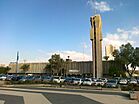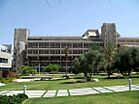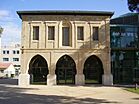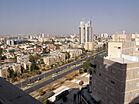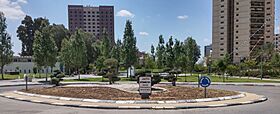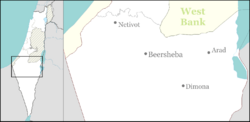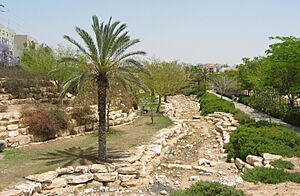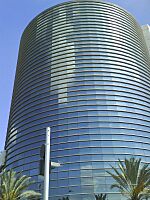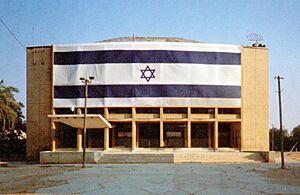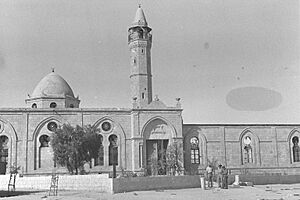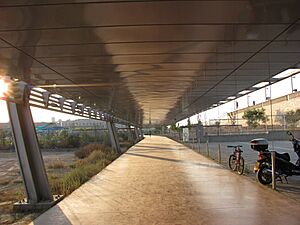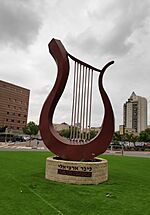Beersheba facts for kids
Quick facts for kids
Beersheba
|
|||
|---|---|---|---|
| Hebrew transcription(s) | |||
| • Also spelled | Be'er-Sheva (official) Beer Sheva (unofficial) |
||
|
From Upper left: Beersheba City Hall, Ben-Gurion University of the Negev, Negev Museum of Art, view of downtown, Volunteers square, Be'er Sheva at night
|
|||
|
|||
| Country | |||
| District | Southern | ||
| Area | |||
| • Total | 117,500 dunams (117.5 km2 or 45.4 sq mi) | ||
| Elevation | 260 m (850 ft) | ||
| Population
(2022)
|
|||
| • Total | 214,162 | ||
| Name meaning | Well of the Oath(see also) | ||
Beersheba (also spelled Be'er-Sheva or Beer Sheva) is a large city in southern Israel. It is often called the "Capital of the Negev" because it is the biggest city in the Negev desert. Beersheba is the eighth most populated city in Israel. It is also the second largest city in terms of land area, after Jerusalem.
People have lived near Beersheba for a very long time, since about 4000 BC. In the Bible, Beersheba is mentioned as the southern border of ancient Israel. The modern city was started in the early 1900s by the Ottoman Empire. During World War I, British-led troops captured the city in the Battle of Beersheba.
After Israel was founded in 1948, many new people moved to Beersheba. Today, many Jewish people live there, including families who came from other countries. The city is home to Ben-Gurion University of the Negev. It is also a growing center for technology and science in Israel. Beersheba is known for having over 250 roundabouts, which are traffic circles.
Contents
- What's in a Name?
- Beersheba in the Bible
- A Look at History
- City Symbol
- Where is Beersheba?
- People of Beersheba
- Jobs and Business
- Learning and Schools
- City Layout
- Arts and Culture
- Getting Around
- Sports in Beersheba
- Environmental Efforts
- Famous People from Beersheba
- Sister Cities
- Images for kids
- See also
What's in a Name?
The name Be'er Sheba has a special meaning. In the Book of Genesis from the Bible, there are two ideas about where the name came from.
One idea is that it means "Well of the Oath." This is because Abraham and Abimelech made a promise, or oath, by a well there. The other idea is "Well of the Seven." This comes from the seven ewes (female sheep) that Abraham gave as a sign of their agreement.
So, the name Beersheba reminds us of promises and wells from long ago.
Beersheba in the Bible
Beersheba is an important place in the Hebrew Bible. It is often linked to the Patriarchs Abraham and Isaac. Both of them dug wells and made peace agreements with King Abimelech of Gerar in this area.
The Bible says that Abraham and Abimelech settled their disagreements over a water well. Abraham had dug the well, but Abimelech's men took it. Abraham gave Abimelech sheep and cattle to get the well back. He also set aside seven lambs as a promise that he had dug the well. Because of this, Beersheba is said to mean "Well of Seven" or "Well of the Oath."
Other Bible stories mention Beersheba:
- Isaac built an altar there.
- Jacob had his famous dream about a stairway to heaven after leaving Beersheba.
- It was part of the land given to the Tribe of Simeon and Judah.
- The sons of the prophet Samuel were judges in Beersheba.
- Saul, Israel's first king, built a fort there.
- The prophet Elijah found safety in Beersheba.
- The prophet Amos mentioned the city.
After the Babylonian conquest, the town was left empty. But later, people returned and rebuilt it. The Bible often uses the phrase "from Dan to Beersheba" to mean the entire kingdom of Israel, from north to south.
A Look at History
Beersheba has been destroyed and rebuilt many times over thousands of years.
Ancient Times
People first settled in this area during the Copper Age, thousands of years ago. They lived in caves and made tools from metal.
The ancient town believed to be the Biblical Beersheba is called Tel Be'er Sheva. It is a few kilometers east of the modern city. This town was built around 1000 BCE. It was likely chosen because there was a lot of water from wells. The town was well-planned, with different areas for homes, shops, and government. It also had a clever water system, including a huge cistern (a tank for storing water) carved into the rock.
Later, during the Roman and Byzantine times (around 64 BC to 7th century AD), Beersheba grew a lot. It was an important defense point against desert tribes. Many churches were built during the Byzantine period.
From Ottomans to Today
In the early 1900s, the Ottoman Empire built the modern city of Beersheba. They wanted it to be an administrative center for the Bedouin people in the Negev desert. The city was called Bir al-Sabi, meaning "well of the seven."
During World War I, Beersheba was very important. The Ottomans built a military railway line to the city. In 1917, British-led forces, including Australian and New Zealand soldiers, captured Beersheba in a famous battle. This battle helped the British take control of the region. There is a cemetery in Beersheba for these soldiers.
Under British rule (after 1917), Beersheba became a major administrative center. However, during times of conflict between Jewish and Arab communities, many Jewish residents left the city.
Beersheba in Modern Israel
In 1947, the United Nations suggested that Beersheba be part of an Arab state. But in 1948, during the war that followed, Israeli forces captured the city. Many Arab residents left or moved to other places.
After the war, Beersheba became an Israeli city. Thousands of new immigrants, mostly Jewish, moved in. The city grew very quickly. New neighborhoods, shops, and schools were built. The Soroka Hospital opened in 1960, and Ben-Gurion University of the Negev was founded in 1969.
In the 1990s, many Russian-speaking immigrants from the former Soviet Union settled in Beersheba. Also, immigrants from Ethiopia came to the city. These new residents helped the city grow even more.
In the 21st century, Beersheba has seen many new developments. There's a large riverfront park called the Beersheba River Walk. New shopping malls have been built, including one designed to be eco-friendly. The city is also becoming a hub for high-tech companies, especially in cyber security.
City Symbol
Beersheba has changed its city emblem several times since 1950. The 1950 emblem showed a tamarisk tree, a factory, and water pipes. In 1972, a new emblem was made with symbols of the Twelve Tribes and a tower. It also included words from the Bible: "Abraham planted a tamarisk tree in Beersheba." Since 2012, the number seven has been part of the city's symbol.
Where is Beersheba?
Beersheba is located on the northern edge of the Negev desert. It is about 115 kilometers (71 miles) southeast of Tel Aviv and 120 kilometers (75 miles) southwest of Jerusalem. The city is on the main road that connects central Israel to Eilat in the far south.
The Beersheba Valley has had people living in it for thousands of years. This is because it has water that flows from the Hebron hills in winter. The main river in Beersheba is Nahal Beersheva, which flows all year.
Climate
Beersheba has a hot, dry climate, like a desert. Summers are very hot and dry, while winters are mild. Most of the rain falls in winter, between September and May, but the total amount of rain is low. Snow is very rare in Beersheba.
People of Beersheba
Beersheba is one of the fastest-growing cities in Israel. It has a population of about 214,000 people. The city is planned to grow even more, with a goal of reaching 340,000 people by 2030.
Most of the people in Beersheba are Jewish. There is also a smaller Arab community. The city is home to many different groups of people, including descendants of Jewish people who came from Arab countries after 1948. Since 1990, many Russian-speaking immigrants and immigrants from Ethiopia have also moved to Beersheba.
Jobs and Business
The biggest employers in Beersheba are the Soroka Medical Center (a hospital), the city government, the Israel Defense Forces (IDF), and Ben-Gurion University of the Negev. There are also many electronics and chemical factories in and around the city.
Beersheba is becoming a major center for high-tech industries, especially in cyber security. Big companies like Deutsche Telekom and Lockheed Martin have opened offices there. A large high-tech park was built near the train station in 2012.
Learning and Schools
Beersheba has many schools, from preschools to high schools. In 2022, about 90% of 12th graders earned their high school graduation certificate.
The city is home to one of Israel's main universities, Ben-Gurion University of the Negev. Other schools include the Shamoon College of Engineering (SCE) and the Kaye Academic College of Education.
City Layout
After Israel became independent, Beersheba became a place for new ideas in city planning. Today, Beersheba is divided into seventeen neighborhoods. Many of these neighborhoods are named after letters of the Hebrew alphabet.
Arts and Culture
Beersheba has a lively cultural scene. In 1953, Cinema Keren, the first movie theater in the Negev, opened there. The city is home to the Israel Sinfonietta, an orchestra founded in 1973. The Beersheba Theater opened in 1973 and puts on many plays.
Important places in the city include "Abraham's well", which is a very old well now part of a visitor's center. The old Turkish railway station is also being developed into a new area. The Negev Museum of Art shows art connected to the Negev desert.
Great Mosque of Beersheba
The Great Mosque of Beersheba was built in 1906 during the Ottoman period. It was used as a mosque until 1948. Later, it was used as a courthouse and then an archaeological museum. In 2011, a court decided that the building should become a museum about Islam, but not a place of worship again.
Getting Around
Beersheba is a major transport center in southern Israel. It has good connections by roads, railways, and air. Highway 40 connects Beersheba to Tel Aviv. Highway 25 connects it to Ashkelon and Dimona.
Buses are a common way to get around the city and to other cities. Israel Railways has two train stations in Beersheba: Be'er Sheva North University station and Be'er Sheva Central station. The train lines have been improved, making travel faster to Tel Aviv. There are also plans to build a light rail system in the city by 2033.
Roundabouts Everywhere!
Beersheba is famous for its many roundabouts, with over 250 of them! This has earned it the nickname "Roundabout Capital of Israel." Many of these roundabouts have fountains, beautiful plants, and sculptures by famous artists. Some are named after important people or events, or after Beersheba's sister cities around the world.
Sports in Beersheba
Beersheba has a strong sports scene. The city's main football team, Hapoel Be'er Sheva, plays in Israel's top league. They have won the Israeli championship five times and the State Cup three times. The team plays at the Turner Stadium.
Beersheba is also known as Israel's national chess center. Many chess grandmasters live there, thanks to immigrants from the former Soviet Union. Chess is even taught in kindergartens! The city hosted the World Team Chess Championship in 2005.
The city also has a large wrestling center and teams for basketball and rugby.
Environmental Efforts
In 2012, the Beersheba "ring trail," a 42-kilometer (26-mile) hiking path around the city, won an award for its environmental efforts.
Famous People from Beersheba
- Orna Banai (born 1966), actress and comedian
- Elyaniv Barda (born 1981), footballer
- Zehava Ben (born 1968), singer
- Ruvik Danilovich (born 1971), current mayor of Beersheba
- Ronit Elkabetz (1964–2016), actress
- Ilan Ramon (1954–2003), Israel's first astronaut
Sister Cities
Beersheba is twinned with these cities around the world:
Images for kids
See also
 In Spanish: Beerseba para niños
In Spanish: Beerseba para niños
 | William Lucy |
 | Charles Hayes |
 | Cleveland Robinson |


